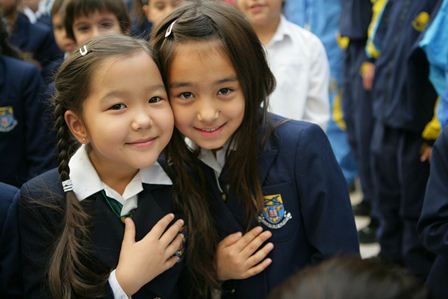Mon, 03/30/2015 - 19:23
Ensuring observance of child rights is defined in Kazakhstan by one of the priorities of the state social policy.
It assumes recognition for the child of all completeness of the social and economic, political, personal rights and freedoms, enshrined in the Constitution, international treaties and other regulations.
Kazakhstan is the participant of a number of the international treaties aimed at providing guarantees and protection of the rights of the child, including the International Convention on the Rights of the Child, International Covenant on Civil and Political Rights, and also International Covenant on Economic, Social and Cultural Rights.
The Decree of the President of the Republic of Kazakhstan of August 23, 2007 about formation of specialized inter-district juvenile courts in Astana and Almaty cities became the major step on the way of ensuring the rights of the child in the country.
Further, the Decree of the Head of the State of August 19, 2008 has been approved "The concept of juvenile justice system development in the Republic of Kazakhstan for 2009-2011" which contained a number of the reforms directed on development and deployment of legal protection system of children in the country. Formation of specialized juvenile courts was provided as the central and most important link of juvenile justice system. For the solution of this task in February, 2012 Specialized inter-district juvenile courts in all regional centers and certain large inhabited localities were formed.
For today in Kazakhstan, for the first time in the region of Central Asia and in the former Soviet Union, 19 specialized courts authorized with special jurisdiction on civil, administrative and criminal cases with participation of minors and connected with protection of the rights of children work.
Considering importance of efficiency and quality of work of specialized juvenile courts for creation and complex development of juvenile justice system, the Department on ensuring activity of the courts under the Supreme Court has been carried out the analysis of their activity for 2014-2015.
Main objectives of the analysis have been determined identification of possible legal gaps, obstacles to effective functioning of juvenile courts system, studying of jurisprudence and compliance of the organization of work of these courts to the international standards.
Results of the analysis showed that in general, formation of specialized courts promoted more careful research of materials of affairs in the relation of minors and provided the expected approaches at settlement of disputes and hearing of cases about offenses and crimes.
For example, as for practice of imposition of punishment, in 2014, in comparison with 2013, the number of the minors convicted by juvenile courts was reduced by 33%. The number of the persons acquitted with these courts increased almost three times with 39 to 115. Every second case is stopped by proceedings, including with application of conciliatory procedures. For 7,3% the number of the affairs ended in order of mediation increased (12% against 4,7% in 2013). It is considerable more humane practice in comparison with practice of the general courts on consideration of criminal cases.
At the same time, the carried-out analysis revealed existence of the single questions and tendencies connected with ensuring the rights of the minors demanding acceptance of adequate measures from authorized state bodies.
For example, the considerable number of the civil cases considered by juvenile courts is connected with deprivation (restriction) of parental rights (38%), administrative affairs - with the offenses connected with non-compliance by parents of obligations for education of children (64%), criminal - with non-compliance by parents of obligations for payment of funds for the maintenance of children by a court decision (65%).
Taking into account results of the analysis offers and recommendations to authorized state bodies are developed. The detailed research opinion is published in the heading "Analytics". It is possible to familiarize with it according to this link.


